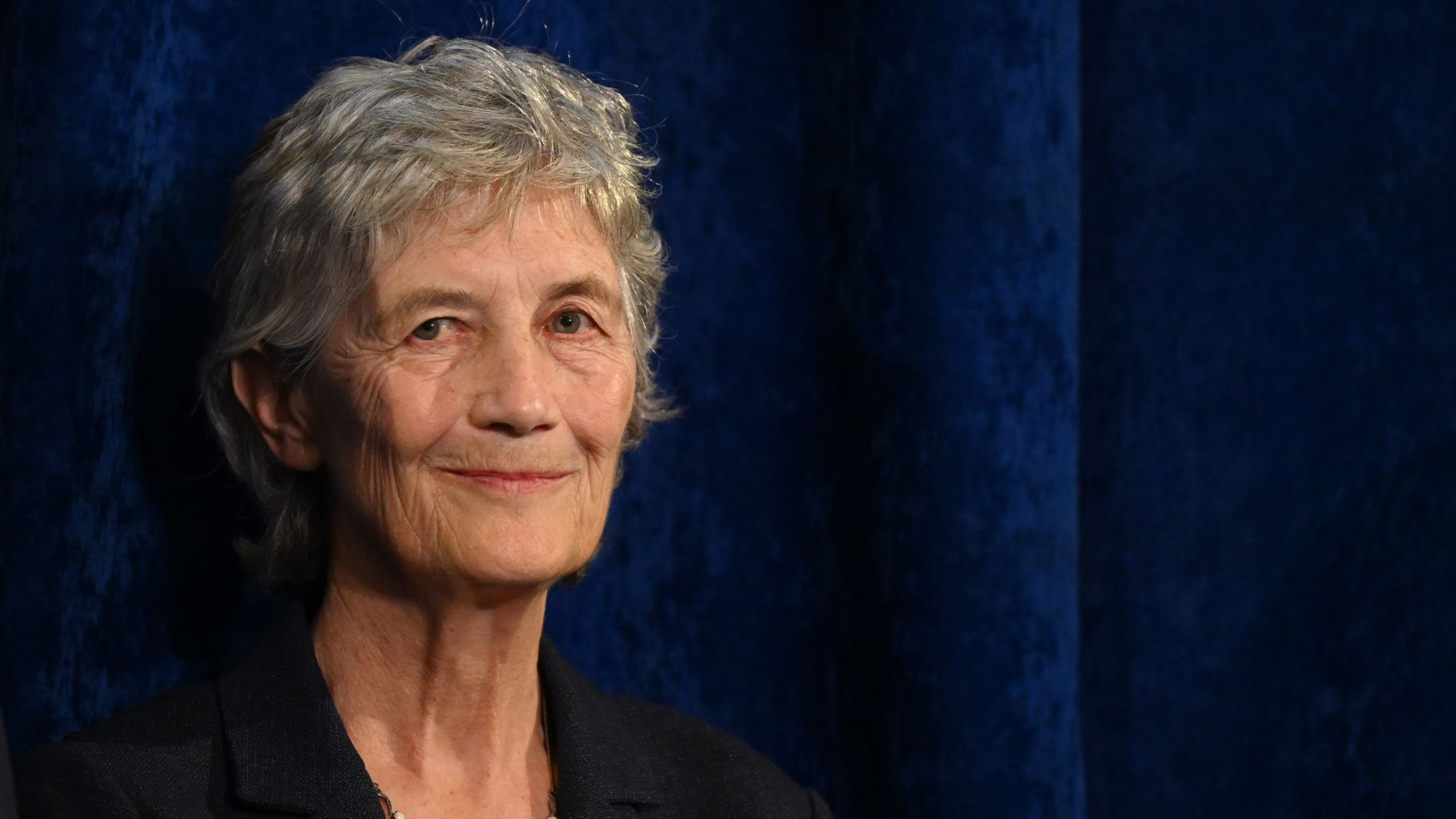The last word: The bad boys of aviation
The pilots who move the world
Let’s say you’re the captain of a Boeing 747 out of Anchorage for Chicago. Except no self-respecting cargo pilot calls himself—or, rarely, herself—anything so leaden, so utterly earthbound as “captain.” You are instead, proudly and defiantly, a “freight dog,” a nom de guerre freighted, so to speak, with many connotations, not all of them positive.
As you pull your 747, or “whale,” onto Runway 6 Right at Anchorage and advance the four throttles to maximum power, air traffic control advises there’s a welter of severe turbulence on your climb-out. A passenger airliner might give it a wide berth, but you, with a load of time-sensitive cargo, barge right on through. Then the turbulence hits and all hell breaks loose. Your 747 is batted about the sky like a shuttlecock. “S---, hang on guys,” your flight engineer says. Then: “Whoa ...we lost something.” The radio crackles, “Ah, four-six-echo-heavy, Elmendorf tower said something large just fell off your airplane.”
Something large? (The National Transportation Safety Board will later determine that your whale performed “an uncommanded left bank of approximately 50 degrees” along with amusement-park pitches, rolls, and yaws that ripped the No. 2 engine clean off the wing.) While all of this is actually happening, perhaps you, the captain, flash to Ernest K. Gann’s classic Fate Is the Hunter, beloved among freight dogs for its vainglorious pilot prose: “We have merely nodded to fear. Now we must shake its filthy hand.”
The Week
Escape your echo chamber. Get the facts behind the news, plus analysis from multiple perspectives.

Sign up for The Week's Free Newsletters
From our morning news briefing to a weekly Good News Newsletter, get the best of The Week delivered directly to your inbox.
From our morning news briefing to a weekly Good News Newsletter, get the best of The Week delivered directly to your inbox.
In any event, you manage to keep the crippled 747 flying long enough to dump fuel and return to Anchorage for a harrowing landing. And as you taxi the jet with its mangled wing, missing engine, and smoking brakes—but the cargo still snuggled safely in the hold—your flight engineer declares: “Buddy, I don’t care how many beers I owed you in the past. This one I’m going to pay off, okay?”
The above incident actually occurred several years ago. It was a 747-121 freighter, but the whole misbegotten adventure, from disintegrating airplane to coolly averted tragedy, would be recognized by freight dogs the world over. Freight dogs famously fly decrepit, “clapped-out,” analog-only hand-me-downs from the passenger airlines, and brushes with the reaper, duly embellished, make for great table rants over pitchers of Watney’s at dog hangouts like the Petroleum Club in Alamaty, Kazakhstan; the Cyclone in Dubai; Sticky Fingers in Hong Kong; and the legendary Four Floors of Whores in Singapore, which, according to the dogs who frequent it, is a model of truth in advertising. It’s an article of faith among freight dogs that George Lucas based Star Wars’ famed cantina scene on the scuzzed-out cargo skippers at Bryson’s Irish Pub, a flyboy Rick’s Cafe adjacent to Miami International Airport through which generations of pilots have passed in a sort of demented finishing school. “We tend to be the rogues of the airline world,” Tony Baca, a 747 cargo captain, told me recently. “The airline pilot is all prim and proper. We’re not. It’s a whole different culture.”
It’s a culture that represents the last gasp of the butt-kicking, globe-trotting, hell-for-leather pilot worldview. Brutal labor relations, increasingly automated aircraft, and the dispiriting post-9/11 environment have torched whatever adventure and romance remain in aviation. But freight dogs never got that memo. Yes, they gripe endlessly about the hours, the food, the lack of sleep, the death-trap airports of Asia Minor and West Africa.
But talk to true dogs for more than five minutes and they betray themselves as hopelessly, permanently, passionately in love with flying and the particular esprit that hauling cargo allows. “All I ever wanted to do is fly,” says Tom Satterfield, an MD-11 freighter pilot. How much? Satterfield worked as a successful chemical engineer for 20 years before chucking it to become a freight dog when he was 41. Who among us can declare without a trace of irony that we absolutely love our work? I wanted to know why freight dogs did. So I flew to Florida and hung around Miami Springs, the honky-tonk ’hood near the Miami airport that has been a freight-dog stronghold for more than 50 years.
A free daily email with the biggest news stories of the day – and the best features from TheWeek.com
My guide was Mike Yannacone, a DC-8 cargo captain. The DC-8 was introduced during the Eisenhower administration; the last one rolled off the Douglas Aircraft line in Long Beach, Calif., in 1972. Yannacone—who drives a Ram pickup, sports a huge wristwatch, and wears a flight jacket emblazoned with FREIGHT DOG—doesn’t waste time worrying about the DC-8’s age. “I get to fly an airplane,” he marveled when we met up at Bryson’s, which gloriously lived up to its rep, with a barmaid who cackled, “What’re you drinkin’, boys?” and a jukebox blasting Mungo Jerry. Every few minutes the walls rattled as another whale rumbled skyward a few blocks south. Yannacone took a pull on his bottle of Sam Adams and shook his head. “And they’re paying me.”
By volume, air cargo accounts for 35 percent of the value of total shipped goods, nearly $3 trillion a year. Which means that in today’s thin-inventoried, we-can-get-it-for-you-wholesale world—where a wayward shipment of turn-signal stalks from Taiwan can cause a Nissan assembly line to seize in Tennessee—air cargo is often the last, best hope to keep world trade trading merrily away. So freight dogs are under blinding pressure to maintain schedules that must go off with military precision, laid down daily at dispatchers’ desks in Miami or Ypsilanti or Dayton or Memphis: Get the cargo there on time. With the global-economic corollary: And as cheaply as possible. The players include behemoths UPS and FedEx, air-cargo’s alpha specimens. (With 669 aircraft, FedEx is the world’s largest airline.) But there’s still room for hand-sewn, niche-filling outfits shuttling car parts and canceled checks—even a carrier that specializes in rushing fresh donor organs from morgues to operating theaters via Learjet.
The cargo itself comprises incomprehensible quantities of the mundane—160,000 pounds of roses, 25,000 wiring harnesses for Chevy Malibus, 5,000 pounds of Grand Theft Auto videogames—but also a full-size armored truck filled with 4 tons of Euro banknotes; a Sikorsky 76 helicopter for the Sultan of Brunei’s nephew; 120 tons of Beaujolais Nouveau; enough condoms to choke a specially chartered 747 to Rio for Carnival.
Then there is the livestock: whales; thoroughbred racehorses; rhinos; dairy cattle; giraffes; elephants; crocodiles; piglets (which escaped and got behind the captain’s rudder pedals); ducklings (ditto); and a daily shipment out of Brisbane of live crickets destined as feed for the world’s zoos.
Airline passengers make much of plunging service standards and fewer frills—of being treated, they whimper, “like cargo.” Freight dogs upend the comparison. “If you’re Joe Shmo, who cares if your flight leaves or not?” Tony Baca told me. “Grab another flight—it doesn’t really matter. But when I’m hauling 100 tons of Nintendo Wiis, it starts mattering. That’s millions of dollars of revenue. You have people waiting at Target for that. One time I ended up hauling 130 tons of Happy Meal toys. And the reason was, a container ship sank in the middle of the Pacific. If a huge shipment has just sunk, you can’t dispatch another ship. So you start hauling Happy Meal toys on a 747.”
Seth Brady, a 747 cargo pilot, recalls being initially mystified when a former employer dispatched a Learjet out of Toledo to meet a British Airways flight at JFK because General Motors had come up five seat backs short at its Corvette plant. “They flew in the extra Corinthian leather from England,” he told me, “put it on the Lear at JFK, ran it up to Pontiac, made the new seat backs in three hours, put them back on the Lear, and took them to Bowling Green, Ky., in time for the production line not to shut down.” Brady wondered “how anyone could afford to fly all these airplanes around”—until he was told that the cost to shut the assembly line was $42,000. Per minute.
So the dogs fly, usually at night, when the world’s cargo moves, in odysseys taken up on a moment’s notice—say, Frankfurt-Dubai-Nairobi-Entebbe-Lahore-Taipei-Hong Kong. Many are on call 24-7, meaning they can’t touch so much as a beer or risk violating the FAA’s eight-hour “bottle-to-the-throttle” rule. Meanwhile, cargo carriers are notorious for pushing everything—aircraft, pilots, and the regulations—to the absolute limit. An investigation published by The Miami Herald depicted an industry fraught with decaying aircraft, shoddy maintenance, flagrant safety-rule violations, and 69 fatal crashes of U.S. cargo planes since 2000 that have killed 85; in a quarter of fatal crashes there were mechanical problems that had not been corrected before the planes were dispatched. The regulars at Bryson’s still talk about the Fine Air DC-8 freighter that crashed on takeoff at the Miami airport in 1997. The cargo, improperly loaded, shifted to the tail, causing the plane to stall and plunge into a parking lot. The pilot’s last words were, “Oh, no.”
All those voyages that start with a beeper call and end four weeks and 100,000 miles later take a toll, of course. Among the afflictions is what the dogs call AIDS—aviation induced divorce syndrome. “There was a Wife No. 1,” one told me, “but there will not be a Wife No. 2.” There’s also strict observance of “what happens in Hong Kong-Dubai-Singapore-Amsterdam-Taipei stays in Hong Kong-Dubai-Singapore-Amsterdam-Taipei.” But a fraternal code is only partial compensation. Baca, who is married to a flight attendant, admitted to me that the life of a freight dog sometimes falls short of glorious even mid-assignment. “There are days where I get to my hotel room and feel like crying,” he says, “because the family is going to do things and I’m stuck in Gambia.”
By necessity, those feelings stay in the hotel. “I can’t worry about the kids and the water heater when I’m shooting an approach in a snowstorm at 3:30 a.m. in Kazakhstan,” he says. “It weighs too much on your head. You will make mistakes. And kill yourself.”
From a longer article by Michael Walker that appeared in the March edition of Men’s Vogue. Used by permission. All rights reserved.
-
 Salted caramel and chocolate tart recipe
Salted caramel and chocolate tart recipeThe Week Recommends Delicious dessert can be made with any biscuits you fancy
-
 Meet Ireland’s new socialist president
Meet Ireland’s new socialist presidentIn the Spotlight Landslide victory of former barrister and ‘outsider’ Catherine Connolly could ‘mark a turning point’ in anti-establishment politics
-
 Should TV adverts reflect the nation?
Should TV adverts reflect the nation?Talking Point Reform MP Sarah Pochin’s controversial comments on black and Asian actors in adverts expose a real divide on race and representation